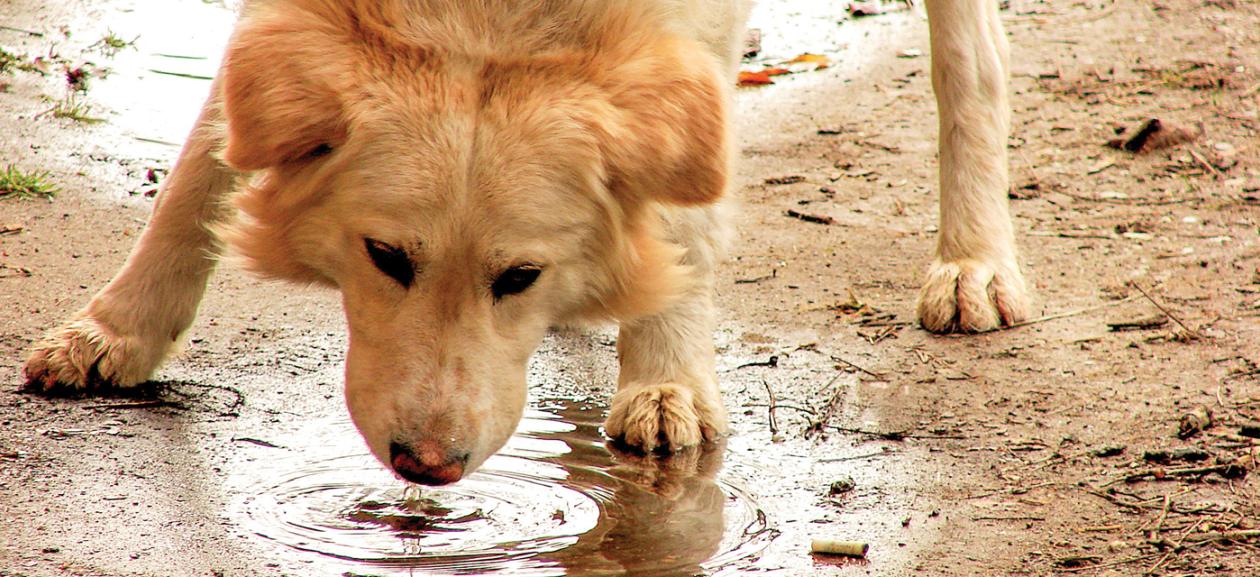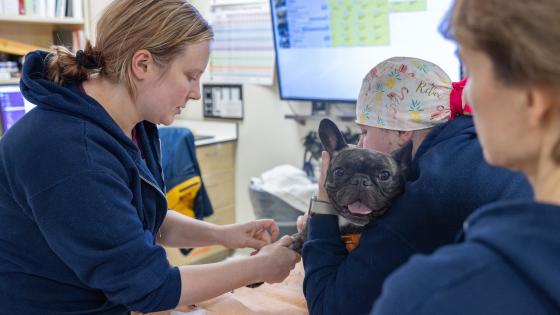
Rainy Season Pet Safety: Hazards, Tips, and Symptoms
As the rainy season settles in, downpours become more frequent, turning our streets and backyards into wet, muddy environments. While this means more puddles to jump into, it also increases the risk of exposure to potential hazards that can harm our pets.
“Dirty standing water can carry harmful chemicals from runoff or dangerous bacteria and parasites that can make your pets very sick,” says Dr. Hannah Marshall, Veterinarian and Critical Care Specialist at DoveLewis. “During rainy weather, it’s essential to stay vigilant and be aware of the risks.”
Beyond the dangers of cold or deep water, here are some additional hazards and practical tips to ensure your pets stay healthy during the rainy months.
Potential Hazards:
-
Leptospirosis: This bacterial infection (caused by Leptospira bacteria) commonly affects dogs, though rare cases in cats may occur with milder symptoms. The bacteria thrive in moist environments and can be contracted from rivers, lakes, streams, or standing water contaminated with the urine of infected animals or wildlife. Leptospirosis can also spread to humans, making it a public health concern.
-
Giardia: A parasite found in contaminated water, Giardia can be spread by feces-contaminated water. This parasite thrives in cool, moist climates and is one of the most common infections in dogs, cats, and birds. It can lead to gastrointestinal issues such as diarrhea and vomiting. Giardia can also spread to humans.
-
Toxins in Standing Water: Motor oil, lawn chemicals, antifreeze, and other hazardous substances can be carried into standing water by rainfall and runoff. If ingested, these toxins can make your pet seriously ill. Winter chemicals like antifreeze, in particular, are highly toxic to animals.
Prevention Tips:
-
Vaccination: Consider vaccinating your dog against leptospirosis. The vaccine, effective for one year, protects against four common strains of the bacteria, though there are many others. Consult your veterinarian about whether this vaccine is appropriate for your pet.
-
Hydration: Offer your pet fresh water during walks and outings. Keeping them hydrated can help prevent them from drinking potentially contaminated water sources.
-
Avoid Risky Water: Steer your pets away from cold, deep, or standing water, especially where runoff or wildlife contamination is likely.
-
Regular Vet Check-ups: Ensure your dog receives annual wellness exams that include fecal screenings for parasites like Giardia. Early detection can prevent serious issues.
Symptoms to Watch For:
-
Leptospirosis: Symptoms include loss of appetite, vomiting, lethargy, abdominal pain, diarrhea, dehydration, excessive thirst and urination, weight loss, stiffness, and muscle pain.
-
Giardia: Watch for diarrhea, vomiting, weight loss, and lethargy.
-
Toxin Exposure: Symptoms vary based on the toxin, but common signs of poisoning include lack of energy, lack of coordination, vomiting, diarrhea, abdominal pain, and loss of appetite.
If your pet displays any of these symptoms, contact a veterinarian immediately. Prompt treatment is essential, especially in cases of leptospirosis, which can lead to permanent organ damage if left untreated.
DoveLewis is open 24/7 for emergencies. If you’re unsure whether your pet needs immediate attention, give us a call at 503-228-7281 or schedule an Urgent Care appointment online. Our team is here to help!
Recent Posts
Holiday Hazards for Your Pet
Deck the halls with boughs of holly … but be sure it’s out of reach of your furry friends! It’s easy to get swept up in the festivities of the season, but don’t forget that added fun means added risks for your pets.




